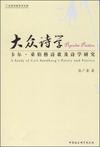大众诗学
出版时间:2008-6 出版社:中国社会科学出版社 作者:张广奎 页数:231 字数:258000
前言
This book is a revised edition of my doctoral dissertation. At its publication,I first feel grateful to my supervisor Professor Ou Hong, and some other scholars and friends. When I was matriculated as a doctoral student by Sun Yat-sen University in 2002, I was immediately attacked by a kind of ignorant fear, because, at that time, frankly and honestly speaking, i hadnt done much in learning and lacked systematic knowledge about literature. In the three years (2002-2005), I had been haunted by the fear that became an impetus driving me forward step by step and little by little. Unfortunately and regretfully l could not have erased it completely from my mind, but it has turned much weaker (and weaker) than hefore. I know the lingering ignorant fear still exists and will be forever a drive for me. Who on earth directed me to have cut down the ignorant fear to a less degree?Who enlightened me academically? Who gave me more space to develop?And who bestowed me more chances to reflect on my missteps and deficiency in learning and personal behavior, to meditate and reexamine myself from time to time? He was and is Professor Ou Hong. He influenced me in many aspects.But, here with thanks, I also apologize to Professor Ou for my imperfections of the three years study. According to him, academic research is a piece of long-term and persistent work and needs much perseverance. So I take, and I have to take, my doctoral dissertation as the first step to learn to walk in academia.
内容概要
该书从探讨文学的社会功能出发,从美国诗人卡尔·桑伯格的出身、社会实践、理想信念、诗歌及诗学等多角度深入研究卡尔·桑伯格以人民大众为基石的大众诗学及其特点和作用,并分析了诗人作为人民诗人成长的历程。卡尔·桑伯格的诗学体现了大众化的诗歌语言、亲民特性、西安市主义的诗歌主题以及格为人民所喜爱的诗歌技巧等。
作者简介
张广奎,男,1967年7月出生。江苏徐州人。广东商学院外国语学院副教授。2005年获中山大学英语语言文学专业文学博士学位,现为南开大学哲学系“美学”方向在站博士后。先后师从于中山大学区鉷教授和复旦大学陆扬教授。研究方向:英语诗歌与诗歌理论、翻译理论与实践、翻译美学和诠释学。坚持走诗歌创作与诗歌理论相结合,以及翻译实践与翻译理论相结合的研究道路。诗歌创作散见于《诗刊》等文学杂志,并出版有英文诗和中文诗歌合集。
书籍目录
AcknowledgementsChronologyAbbreviationsIntroductionChapter One Common Origin and Early Wandering Ⅰ.From Midwest and the Common Folk Ⅱ.A Hobo in the West Ⅲ.Wanderer-Jailbird's Throes: Predawn Darkness of a PoetChapter Two Socialistic Tendency Ⅰ.Sandburg's Socialism Concept Ⅱ."An Ardent Socialist" Ⅲ.Advocator of DemocracyChapter Three The People, Yes,and "Yes" What? Ⅰ. "Who and What Are the People?" Ⅱ.Universalism: His Guide to Universal People Ⅲ.Chicago Poems Ⅳ.Cornhuskers Ⅴ.Smoke and Steel Ⅵ.Slabs of Sunburnt West Ⅶ.The People, Yes Ⅷ."Yes" What?Chapter Four The Popular Poetics on the Basis of the Commons Ⅰ.His Poetic Theory and Social Function of Poetry Ⅱ.The People as the Foundation Stone Ⅲ.The Realistic Poet and His Circular Development Ⅳ."Sense of Nativeness" in Grain Ⅴ.Common Subjects with Great Passion Ⅵ.Heritage from Walt Whitman Ⅶ.Unique Poetic Style Ⅷ.Musicality in Sandburg's PoetryChapter Five The Saudburg Range and His Influence Ⅰ.The Minstrel Ⅱ."Mr.Song-Bug's Sand-bang" : The American Songbag Ⅲ.Obliging the Young Ⅳ.His Influence on Modern Poetry Ⅴ.Among the PeopleConclusion Ⅰ."Tradition Is a Bottomless Hol~!" ~ Ⅱ.Yes! The People's Poet, the Popular PoeticsBibliography后记
章节摘录
Sandburgs origin——the very ordinary family and the bottom of the society works much to lead to his life long concern for and connection with the ordinary people, playing a role in the formation and growth of his popular poetics. This part discusses his family background and his early wanderings in the west as a hobo and experiences before he came to Chicago to start his career, which resulted in his profound sympathy with the commons and laid a solid foundation for him to become the peoples poet. Sandburg was born in prairie Galesburg, Illinois on January 6, 1878. His father, Carl August Sandburg, was a Swedish immigrant ( his mother, a Swedish immigrant too, a housewife and once a hotel maid) and one of thousands of semiliterate immigrants who came to the United States in search of American dream, only to find he had to endure, like many of his group, inhuman working conditions and the humiliation from the social system that was oppressive and showed enough indifferenee to his and their stroggles. His father worked ten hours a day, six days each week for 35 years as a blacksmiths helper for a railway company. And Sandburg received stem and sometimes even harsh discipline from his father who worked with unrelenting toil in the pioneering spirit of American workingmen.
图书封面
评论、评分、阅读与下载
